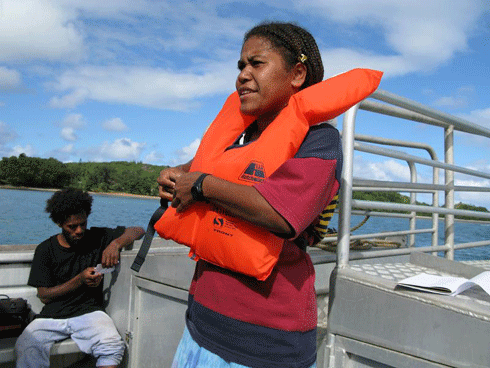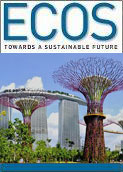
|
Published: 12 March 2013
'Good gender practice' in delivering aid
A group of private sector organisations involved with the delivery of aid to developing countries used International Women’s Day on 8 March to highlight the achievement of good gender practice on development assistance projects.

|
|
Through aid funding, this Vanuatu woman has been trained to operate a boat that ferries tourists between their cruise ship and the island. Credit: IDC
|
The International Development Contractors (IDC) group brings together more than 20 Australian and international private sector organisations that manage the delivery of international aid to the world’s poorest countries, on behalf of organisations such as AusAID.
IDC Chairman Mel Dunn said International Women’s Day provided an opportunity to focus on the importance of gender equity and equality on development assistance projects.
‘Our members are involved in many major international development programs around the world, and pride themselves on their ability to incorporate good gender practice into their work,’ Mr Dunn said.
‘This is particularly important because in many countries where IDC members operate the role of women in policy formation and management is weak, despite the important role they play in their local economy.’
For example, Sinclair Knight Merz (SKM) has pursued a holistic approach to advancing women’s interests through its role as managing contractor of the AusAID-funded RAMSI Solomon Islands Infrastructure Partnerships (RSIIP) 2011-14.
This has encompassed research into women’s employment in the building industry, including women’s participation in the Solomon Islands Built Environment Professional Association, as well as incorporating gender issues in the design and implementation of infrastructure.
As at July last year, almost 25,000 women were receiving better incomes as a result of an Enterprise Challenge Fund, managed by Coffey International Development and funded by AusAID.
These changes have been in the form of obtaining employment, accessing better goods and services and becoming part of business supply chains.
The trickle-down effect is significant, with women not only gaining access to an improved quality of life, but also their families, particularly children.
In Africa, Adam Smith International has been working with women’s business groups in Nigeria to advocate to Government on business environment issues affecting women.
The aim is to provide significant income and employment opportunities to women, resulting in enhanced rates of poverty reduction and decreased vulnerability to economic shocks.
UniQuest and The University of Queensland have conducted more than 20 short courses specifically designed to enhance the skills and knowledge of government officials, civil society and the private sector in developing countries. More than 600 people from over 65 countries have already participated in these courses.
For example, the Organisational and Employee Development course explored non-discriminatory HR practices and the challenges faced by women in leadership across Africa.
In Vietnam, an AusAID funded investigation into the HIV risks, service needs and preferences of women who inject drugs identified that current modes of service delivery are unlikely to reach women at significant risk of HIV infection.
IDC member, Nossal Institute Limited at the University of Melbourne, conducted an investigation that has filled critical research gaps, including the characteristics of female injecting drug users, the extent of overlap with sex work, pathways into drug use, HIV risk practices, and harm reduction coverage.
IDC Members manage (on AusAID’s behalf) programs valued at over A$2 billion in total, which AusAID has estimated represents around 23 per cent of the annual delivery of its aid funding.
Source: IDC



